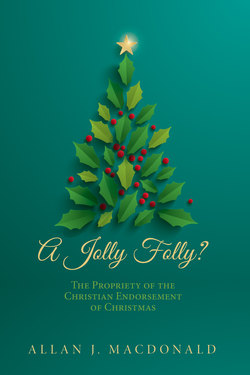Читать книгу A Jolly Folly? - Allan J. Macdonald - Страница 6
На сайте Литреса книга снята с продажи.
Introduction
ОглавлениеWhat is Christmas all about? Should the Christian endorse it with joy or reject it as folly?
A subject such as this is not fundamental to salvation, therefore, we have to bear that in mind when discussing it. It is a subject we are obliged to the Lord to discuss with toleration and respect for other Christians who adopt a view different to ours. The believer’s sins are completely and eternally atoned for by Christ, yet the Day of Judgement will frustrate many present expectations regarding which believers lived their lives most pleasing to Christ.
The view held and presented here is that, on balance, Christmas is something that Christians should not recognize or practice in any religious sense. The view is founded upon a Reformed/Calvinistic interpretation of Scripture, with a mind-set which seeks to implement in every area of life the precept of Matt 28:18–20:
And Jesus came and said to them, “All authority in heaven and on earth has been given to me. Go therefore and make disciples of all nations, baptizing them in the name of the Father and of the Son and of the Holy Spirit, teaching them to observe all that I have commanded you. And behold, I am with you always, to the end of the age.”
In the minds of most people on earth, Christmas is the festival most people associate with Christianity. However, the Lord Jesus did not do Christmas, neither did his disciples and apostles. Following the ascension of the Savior, none of his followers that we know of celebrated his birth at any time of the year, or any “holy” day on December 25.
The earliest of the church fathers whose writings are extant and accepted as credible, had no such known practice. In other words, it was not something which Jesus had commanded his disciples to do or to teach other nations to do.
Following the Protestant Reformation in Scotland in 1560 it was banned and by the time of the second Reformation period of the 1640s it was banned and made a civil offense in England and also in New England, to which many of the Puritans emigrated. Although the ban was partly repealed in 1686 and then in 1712, December 25 remained a normal working day in Scotland until the late 1960s with normal league soccer matches played until the mid-1970s. Even in England national newspapers were published on this day until WWI and postal mail continued to be delivered until 1961. In the USA, it was as late as 1950 before the General Assembly of the PCUS formally sanctioned the religious observance of Christmas. Today some Christians still do not do it. This begs the question why Calvinist churches, which made so much of the Bible as the sole basis for their belief and practice, were so consistently opposed to Christmas!
We will look in the first instance at the historical basis for Christmas in Europe, from the pagan customs of the Roman Empire through its evolution in the new empire of the Roman Catholic Church. We shall then examine the development of Christmas down through the centuries. A chapter on New Year will examine how it has evolved in tandem with Christmas. Next we shall consider the evolution of Christmas in Britain, particularly from the Reformation to the present day. Then we shall reflect upon the source for all the familiar customs still practised today in much of the world—the great Victorian Christmas.
Having placed the whole issue in its historical context, we shall then contemplate the practical significance for the Christian, both in a social and religious context, including extensive reflection upon the Regulative Principle of worship. Reasons given by Christians to justify their endorsement of Christmas are considered and finally, we will draw a conclusion on the issue and pose some thought provoking questions. Sprinkled throughout are various excursuses, on Mithraism, Lutheranism, and Zurich and Geneva.
